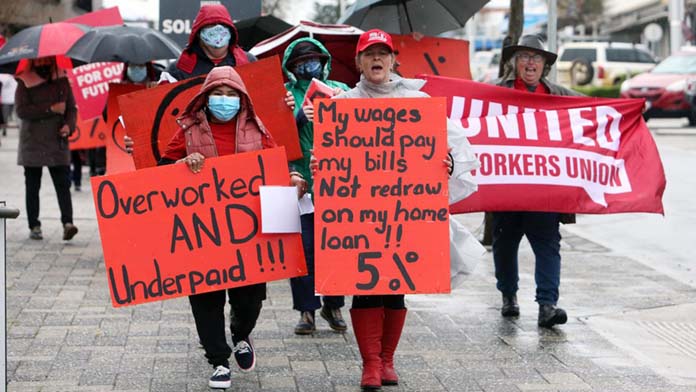Labor’s budget is about making it look like the government is acting on the cost of living, in the hope of dampening the anger workers feel about it in time for an election in the next year.
The budget includes some short-term cost of living measures, with the biggest the $300 power bill rebate for every household. But it does nothing to fix the big problems driving inequality such as house prices and poverty-level JobSeeker payments for the one million people relying on income support.
The continual failure to raise the rate of JobSeeker is particularly shameful, after the government’s own advisory committee appealed for it to be a “first priority” in this year budget, saying it needs a $120 a week increase.
The government is also increasing rent assistance, although by just $9 a week for a single person, and freezing the cost of prescriptions for concession card holders.
Treasurer Jim Chalmers has been at pains to say that his cost of living measures are designed to reduce inflation, calculating they will see it drop to 2.75 per cent by December.
More spending would simply make inflation worse, he claims.
But Labor is still passing down the amended Stage Three tax cuts.
While low income earners get more than originally planned, the rich will still benefit the most, with $4500 a year handed to anyone earning $200,000.
This is money that could be going into raising JobSeeker, or funding hospitals, housing or education.
There is not a single effort to tax the rich in this budget—despite the ballooning cost of negative gearing for property investors, at around $100 billion in the next four years, and superannuation tax concessions for the wealthy.
And there are still billions being wasted on military spending and new weapons, with $55.6 billion going on defence in the next year alone. An appalling $13.6 billion will go towards the effort to acquire nuclear submarines in the next four years, 50 per cent more than all the new cost of living measures rolled together.
Despite its boasts about the Future Made in Australia package as a way to drive the clean energy transition, the level of spending involved is modest. Over the next four years it averages just $662 million a year.
Even over the next decade the $22.7 billion planned is less than half the $50.3 billion increase going to the military.
Nor is this designed to respond to the climate emergency through investing in installing renewable energy to rapidly slash emissions now.
The funding is mostly designed to help establish industries based on newly-emerging technology, such as renewable hydrogen, green metals, as well as mining critical minerals used in high-tech products like mobile phones, computers and electric vehicles.
Jobs and wages
The peak union body the ACTU has celebrated the prospect of higher pay rises, which the budget says will increase at above the rate of inflation by 0.5 per cent every year for the next three years.
Some of this will be a result of the plans to fund wage increases for low-paid workers in childcare and aged care, although how much they will get is up to the Fair Work Commission.
But for most workers the figures are just a prediction that may never eventuate.
The budget reveals a weak overall economy, expected to grow this year by an anaemic 1.75 per cent and just 2 per cent next year. Unemployment is tipped to rise to 4.5 per cent by June next year.
Aside from the $5000 payments for women leaving violence and a small increase in funding for emergency housing already announced of $1.4 billion over five years, there was nothing for services to deal with the causes of family violence.
The changes to HECS indexation, halving last year’s 7.1 per cent increase to debts and limiting increases in the future, have been confirmed. This will help young workers paying off HECS debts, but still leaves them with hefty repayments.
But Labor has refused to reverse the Job Ready Graduates changes that have pushed the cost of a three year Arts degree to $50,000.
Refugees have been left behind again, with the promised increase in the total refugee intake again delayed. Around $20 million less was spent on financial support for asylum seekers in the last year despite increasing need, continuing the Coalition’s cruel cuts. But another $604 million has been allocated to detain the existing 100 people on Nauru over the next year.
This isn’t a budget for workers. It’s another failure to tax the rich to fund the housing, health, cost of living and climate measures that are urgently needed.
By James Supple






